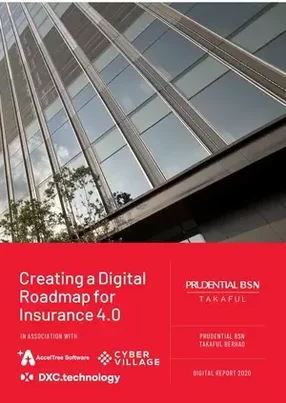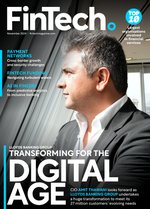The sharp trajectory of change currently being experienced in insurance (and Takaful) makes it one of the most exciting industries of the digital era. Already grappling with the paradigm-shifting advances of digital transformation at the start of 2020, COVID-19 shifted the sector’s perspective to a dual emphasis; companies realised that technology was not merely a tool for streamlining the status quo, but rather the method by which the business could actively improve its customers’ lives and provide stability to global economies. Few companies were better poised to take a regionally leading role in this ‘new normal’ than Prudential BSN Takaful Berhad (PruBSN), the largest takaful insurance provider in Malaysia.
Founded in 2006, the company has swiftly risen to prominence. “When I first joined PruBSN in 2014, having moved from Prudential Indonesia, we had already been the Number 1 Family Takaful company within the very large Islamic Financial Market of Malaysia, since 2010.” explains Ahmir ud Deen, Chief Operations Officer (COO) of Prudential BSN Takaful. “However, despite that, there is still plenty of room for us to grow.” A highly experienced executive in the APAC insurance market, Deen earned a degree in Actuarial Science from the London School of Economics (1988 to 1991) prior to starting his insurance career in Dubai. From there, he moved to the Asia Pacific Region, with Allianz in 1997, joining their Indonesian Life Company just a few weeks before the Asian Financial crisis hit the region. He completed a stint with Allianz in his native Pakistan spending four years as CEO of Allianz-EFU Health Insurance, before moving back to the Indonesian Market in early 2005. After 13 years with Allianz, he joined Prudential Indonesia as Chief Financial Officer and finally took on his current role at PruBSN in 2014, Deen says that he came to recognise both the challenges and significant potential of the Malaysian market, especially in the area of Islamic Insurance or Takaful. “Malaysia is a fairly heavily regulated market, but I don’t mean that in a negative way. While we always have to stay within the Islamic guidelines; the regulations are also there to look out for the interests of customers and manage the sustainability and the long term viability of Insurers and Takaful operators.”
Deen characterises the market within which PruBSN operates as “well-established”, but with relatively lower penetration and plenty of opportunity. Recognising that, on the whole, customers of all demographics are still served predominantly through agents and branches, PruBSN is striving to also accommodate Malaysia’s younger generations with more tech-savvy, digitally-focused alternatives and services. “We embarked on our digital transformation journey more than five or six years ago,” he says. “and coincidentally just over a year ago, we moved into a new office and decided that we would make the office entirely wifi enabled and fully digitalised, with flexible workstations and work areas for everyone.” This development, it turned out, was highly perspicacious and enabled PruBSN to quickly mobilise for remote working when the COVID-19 pandemic began to escalate. “I would say that we hit the ground running: we were set up within a week, including a new sales process that allowed our Agents to enroll new customers digitally. This gave them the ability to continue serving prospective customers while still following the safeguards required in the market.” However, more than that, the pandemic awakened the industry to the gaps in insurance protection and how it could improve even further.
Following the original lockdown (or “Movement Control Order” as it was called in Malaysia), insurance and Takaful has been increasingly seen as a tool to enrich and improve the lives of customers rather than simply providing policies (‘certificates’ in Takaful terms). As such, PruBSN understood that the conditions of the coronavirus crisis provided the opportunity to demonstrate its strong ethical standards. “Most traditional insurance coverage and Takaful certificates used to have an exclusion for pandemic situations and illnesses. We immediately stated that we would be removing or not applying that exclusion,” says Deen. Furthermore, with its increased flexibility, the company was able to offer a further range of benefits to clients, including new benefit payouts for ‘confirmed diagnosis of COVID-19’ and ‘death from COVID-19’ as a free add-on to their existing coverage. “The whole industry also came together and set up some funds to even cover those people that may not have been protected at all,” he continues. “I think the pandemic has changed the paradigm for all of us: it's a new awakening and it's going to have a permanent impact on the industry.”
PruBSN’s digital transformation continues to guide the direction of its approach. Initial innovations included an online, tablet-based point of sales system that allowed agents to meet customer needs faster and more effectively, and after that, building an omnichannel customer portal to facilitate the younger generations’ interest in being able to self-service. The company has also been investing in the development of several apps designed to drive engagement and foster a closer relationship with users and customers. “One very popular app for us, being an Islamic company is “PruBSN Insan”, which gives users daily prayer reminders, amongst other, spiritual advice.” Another more recent one is ‘Pulse by Prudential’: Pulse marks a step change in Asian health management by making healthcare more inclusive and accessible. By supporting users in every step of their health and wellness journey, PruBSN is going beyond its core business of providing protection and playing a greater role in helping people prevent and postpone the onset of diseases. With a holistic approach supporting the three stages of a person’s health journey – Prevent, Postpone, Protect – Pulse takes healthcare to a new level of engagement with consumers. The goal is to seamlessly integrate personal health checks and management into everyday life by providing users with mobile tools and real-time information that they can access wherever they are, whenever they need it.
Pulse received its Malayian launch in August 2019 and is now available in 11 markets across Asia. In addition to being available in 10 local languages, the app also incorporates epidemiology and available to download free of charge. Following the completion of a medical questionnaire, a report is generated by Pulse that includes a realistic 3D representation of the body, called the ‘digital twin’, as well as health advice to help the user reduce their risk of disease and improve overall well being. “We see this whole ‘ecosystem’ as becoming a central tool, not only for our customers, but also for our agents to promote and share with potential customers,” says Deen. “PruBSN doesn’t want it to be a formal, boring app that you only look at if you’re sick; it has to be a fun and useful tool as well, one that helps you to manage the healthcare as well as financial needs for yourself and your family.”
In Deen’s opinion, these significant changes to the customer experience are preparing PruBSN for “insurance 4.0” - an equivalent term to ‘industry 4.0’ or the ‘fourth industrial revolution’. The company’s journey along this tech-infused path has been assisted by its strategically chosen partners, such as AccelTree, DXC and Cyber Village, among others. Deen provided us with further details on these relationships and the projects they’ve worked on together:
AccelTree: Based in India, this software solutions provider has played a key part in PruBSN’s digital transformation: “We worked with AccelTree to build our point of sales system since 2013; this relationship has helped us to modify, speed-up and expand the whole on-boarding system for our customers. AccelTree has and continues to be a key partner for us in building these digital journeys and facilities.”
Cyber Village: A leader in digital engagement technology solutions for the Malaysian market, the company is a pioneer in ecommerce and transformational infrastructure. “Cyber Village helped us build our customer portal, back in 2016” he explains. “We’ve subsequently enhanced that further and recently also developed an innovative, Islamic ‘crowd sourcing’ app with them, that allows you to chip in money as you see fit for simple benefits such as for death and funeral services. It’s not just about putting money in for oneself; it’s something the wider community will be able to take advantage of, as and when they need it. And we see this as just the start of what can be offered in this very exciting way for our society.”
DXC: “DXC specialises in building main business systems applications for the insurance and Takaful Industry. PruBSN and our sister company have been in the Malaysian market for over 15 years and 95 years respectively, and we have a huge database of more than three and a half million customers. We are currently migrating this data to a new system supplied by DXC and foresee more stable and efficient systems as we move forward, together.”
The strength of PruBSN’s vision and its preparation for insurance and Takaful’s digital era means that it is well-prepared to meet the challenges of 2021. “We’ve got a very clear and detailed roadmap of what we want to do, whether that’s integrating our businesses, our industry, and our companies onto shared platforms, or giving our customers the best and broadest experience available. Giving people the ability to make the most out of life is our purpose.” According to Deen, “We are on this journey primarily for our customers and partners and would not have been able to get this far without the great teams that we have in place, whether inside PruBSN or together with our colleagues from Prudential in Malaysia and the wider Asia Pacific Region.” However, having proven itself throughout the pandemic as a company dedicated to providing peace of mind at a time when customers need it the most, PruBSN is eager to embrace and adapt to the industry as it changes. “It’s a brand new world. It’s an open world, and it’s an opportunity for everyone to take part,” Deen concludes. “Insurance is often considered to be a very traditional and conservative industry, but you’ll be surprised how fast moving and modern we can be.”


